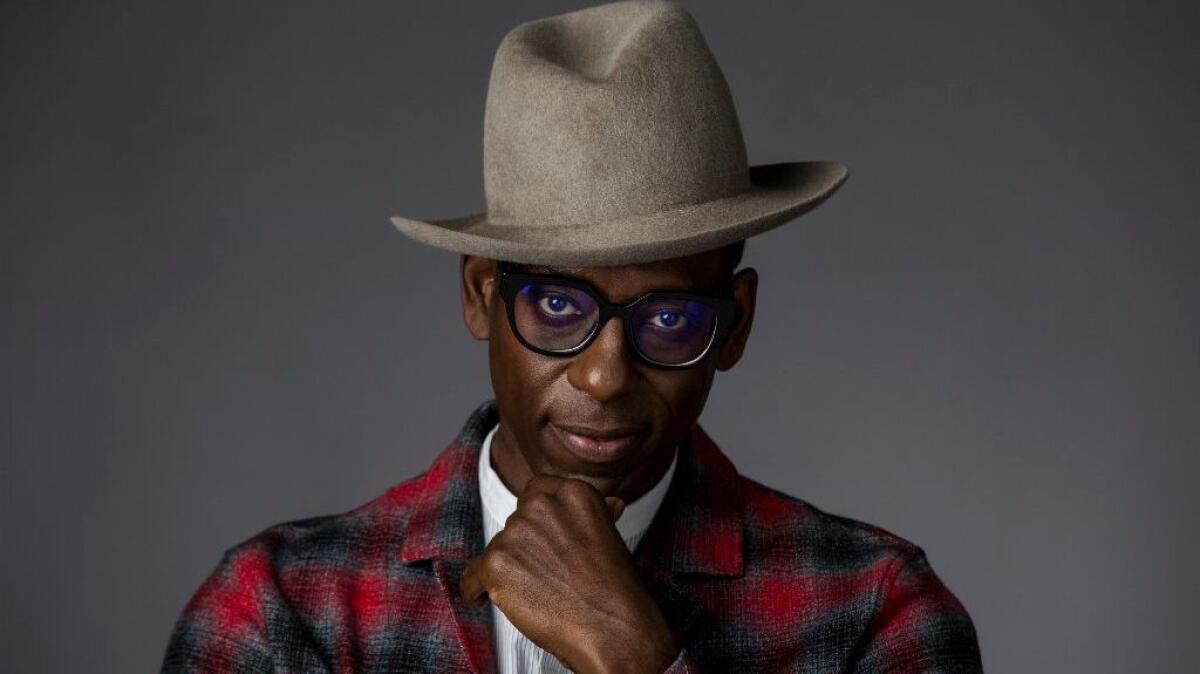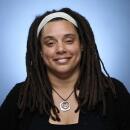‘American Gods’ star Orlando Jones understands that you may not know where you know him from

Orlando Jones has a long list of people for whom he is sometimes mistaken. It is varied and amusing, for him at least.
As it says in his Twitter profile — a platform on which the veteran comic, writer and actor is very active — he is “Not the little boy from Everybody Hates Chris. Not Solange Knowles. Not Orlando Brown/Bloom. Not Juwanna Mann. Not Jeff Goldblum in blackface. Not Mos Def.”
“Let me be very clear, I have apologized to Solange during press,” says Jones, who has been working in Hollywood since being plucked out of college when he was just 19. (Also, Wesley Snipes: “I have signed many Wesley Snipes autographs in my life.”)
So where have you seen him? In the ’90s: in the movie “Office Space,” as part of the ensemble of the Fox sketch-com “MadTV” and telling you to “Make 7UP yours!” in a ubiquitous ad campaign. In the the ’00s: in “The Replacements,” “Drumline” and “Everybody Hates Chris” (for the last, a couple of guest spots as Dr. Clint Huckstable). In the ’10s: starring on Fox’s cult favorite “Sleepy Hollow” and, in a stunning dramatic turn, “Madiba,” the recent BET miniseries about Nelson Mandela.
Next, Jones makes a vivid entrance in the second episode of “American Gods” Sunday as the cunning trickster god Mr. Nancy.
We recently chatted with the voluble, hilarious, thoughtful and nattily attired Mobile, Ala., native about, among other things, his career, writing versus acting, and the way “American Gods” tackles issues of race.
You were just 19 when you started writing for the “Cosby Show” spinoff “A Different World.” Was that your first big break?
Absolutely. I met a producer when I was performing in college, and he took me to lunch and explained some Hollywood basics to me. He said, “Listen, there’s a show, in its fourth season; they’re looking for young writers. Write a spec script, send it in. Let’s see.” They read it and said, “This sucks but you’re funny and we’re interested in hiring you for a job.”
You had been working in advertising, writing for other stand-ups, writing screenplays, so clearly writing was always part of the mission as well as performing.
It was very much, absolutely. I mean I was a huge Albert Brooks fan and Shelley Berman, and I fell in love, obviously, with the Cosbys of the world, the Dick Gregorys of the world.
Then when I got here, I got very much educated by a lot of the old Jewish comedy writers. They took me under their wing. They took a lot of time to really help me understand what was going on so that I didn’t take the fallback position that everything [negative] that was happening [to me] was racism, and I’m forever grateful to them.
Did this tutelage and writing for other people’s voices end up informing your acting, which came later?
Very much so. It’s because, for me anyway, I feel like I didn’t understand until they taught me what a writer did. I thought my job was to write things that I thought were funny. I began to quickly understand that a writer’s job is to become a part of the executive producer’s brain.
Since I have been in Hollywood, I have wanted to tell stories that came from a place that I understood. But in my job writing sitcoms, my job was to become somebody else’s brain and write the stories from their point of view. Often in your job as an actor, your role is to figure out your place in this story but again from the point of view of the director, of the writer. You’re consistently doing someone else’s point of view.
In this particular case, I was connected very much to Nancy because I had an emotional connection to his point of view. That’s happened with other characters, before but not in a way where I could talk so unapologetically about circumstances that often make people uncomfortable.
Yes, your character comes in tackling the concept of slavery and racism head-on, which has always been a difficult subject but seems even more fraught now.
Black people don’t know what white privilege is. We’ve never experienced it before and white people don’t know what racism is. They’ve never experienced it before. It always feels like two sides are yelling at each other. What’s most daunting to me is that I love racists because I don’t know anybody that doesn’t have somebody in their family that’s homophobic or racist or falls into some sort of -ism or some negative.
I don’t know anybody who wants that person to be killed, murdered or hurt, because we know that person from a different point of view. I know people who loved me and raised me and took care of me and nurtured me and the fact that they may not like these [white people] is based on their experience and the oppression they’ve felt with them. I mean, you can call it racism, discriminatory, prejudice. I choose to call it discriminatory or prejudice because racism, you truly have to be in power to be a racist. A person who has no power really can’t be racist.
To some, it will be remarkable that a show like “American Gods,” a show with so much technical flash and graphic scenes of sex and violence, is really interested in the nitty-gritty of human issues like that.
[Executive producers] Michael Green and Bryan Fuller and Neil Gaiman are very deeply affected by the conditions one is often forced to live in and how blind people are to the stripping away of rights. There’s something beautiful about storytellers that have something that they want to say and aren’t afraid to say it.
You certainly haven’t been afraid to tell your stories either on screen or through Twitter or in your stand-up. Since you work as an instrument of the creators in film and TV, is the stand-up even more important as an outlet of your own expression?
Yeah, for me stand-up is naked. I mean, you’ve got to be OK looking at all the imperfections in you. That’s tough. Then you’ve got to be OK to laugh at it and not take that — something that’s so painful to you — so seriously.
It’s important to me, I think, because I get to look in people’s eyes. I get to see their faces and we get to laugh about it. Hopefully, we get to all leave on that high with that vibration, with that energy, being a part of what our experience was together. Hopefully, that can translate to what’s happening in somebody’s own life and not my own.
When people don’t think you’re Solange, what role are you most recognized for?
I wish I could track it. What I’ve come to learn is “The Replacements” is always on. There’s always some NFL player that they’re calling Clifford Franklin or some NFL receiver who’s doing one of my end zone shenanigans from that film. If you went to a historically black college, you’d know Dr. Lee [from “Drumline”]. For reasons I will never quite completely understand, “Office Space” never goes away. This little Southern blond lady, she’s, like, “I know you from somewhere, you look so familiar. I don’t know where I know you from.” I was, like, “I don’t know where you know me from either because I don’t know you.” And she goes, “Oh, my God, [quoting] ‘You ain’t representing, you ain’t keeping it real.’ I love that man! You are so funny.” She recognized my voice from “Double Take.” [Laughs.] I guess what I really have most been surprised by is that I don’t know. I have no clue what people are going to respond to.
But that’s kind of a treat, right?
It’s amazing.
ALSO:
Ian McShane sees a timely immigrant theme in ‘American Gods’
The deities behind ‘American Gods’ are off to a bloody start
Review: Starz ‘American Gods’ is as stellar as it is supernatural
More to Read
The complete guide to home viewing
Get Screen Gab for everything about the TV shows and streaming movies everyone’s talking about.
You may occasionally receive promotional content from the Los Angeles Times.







